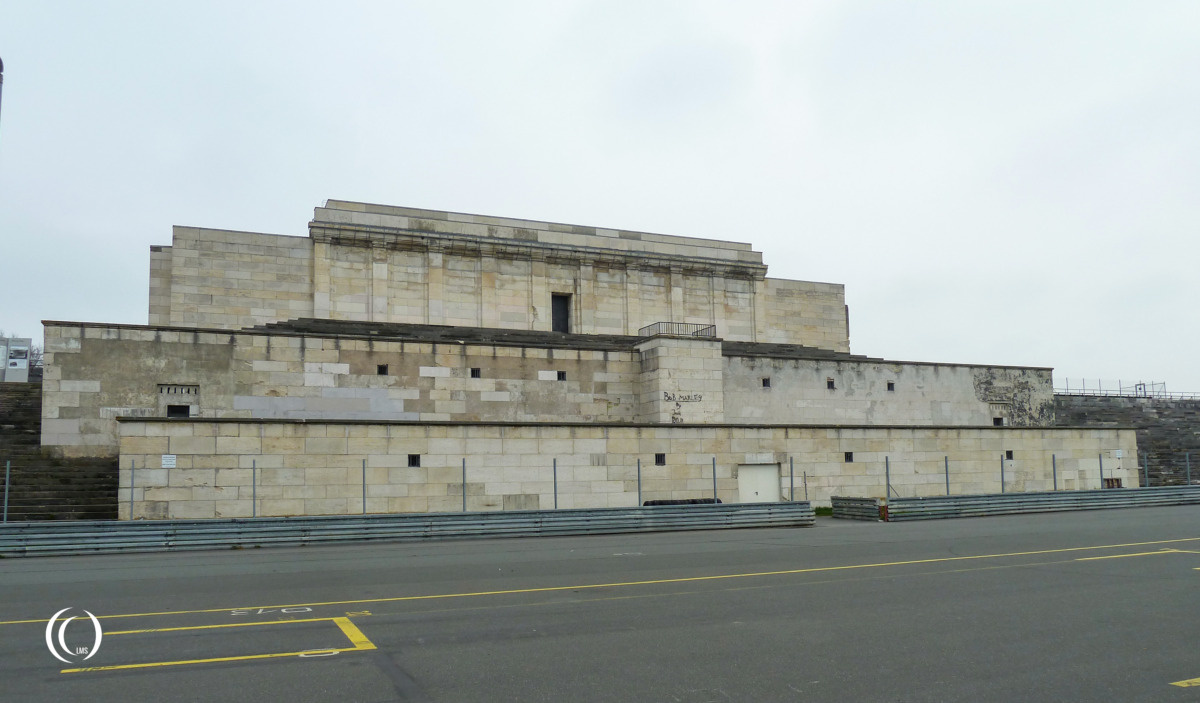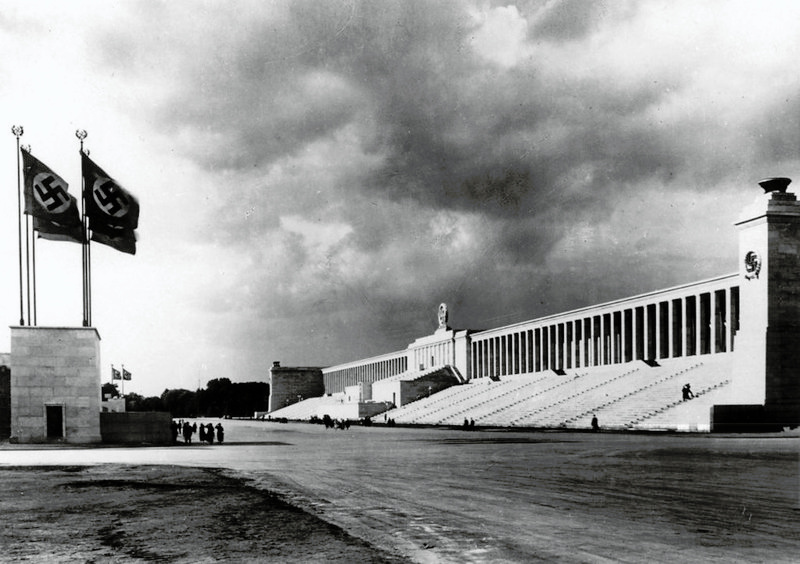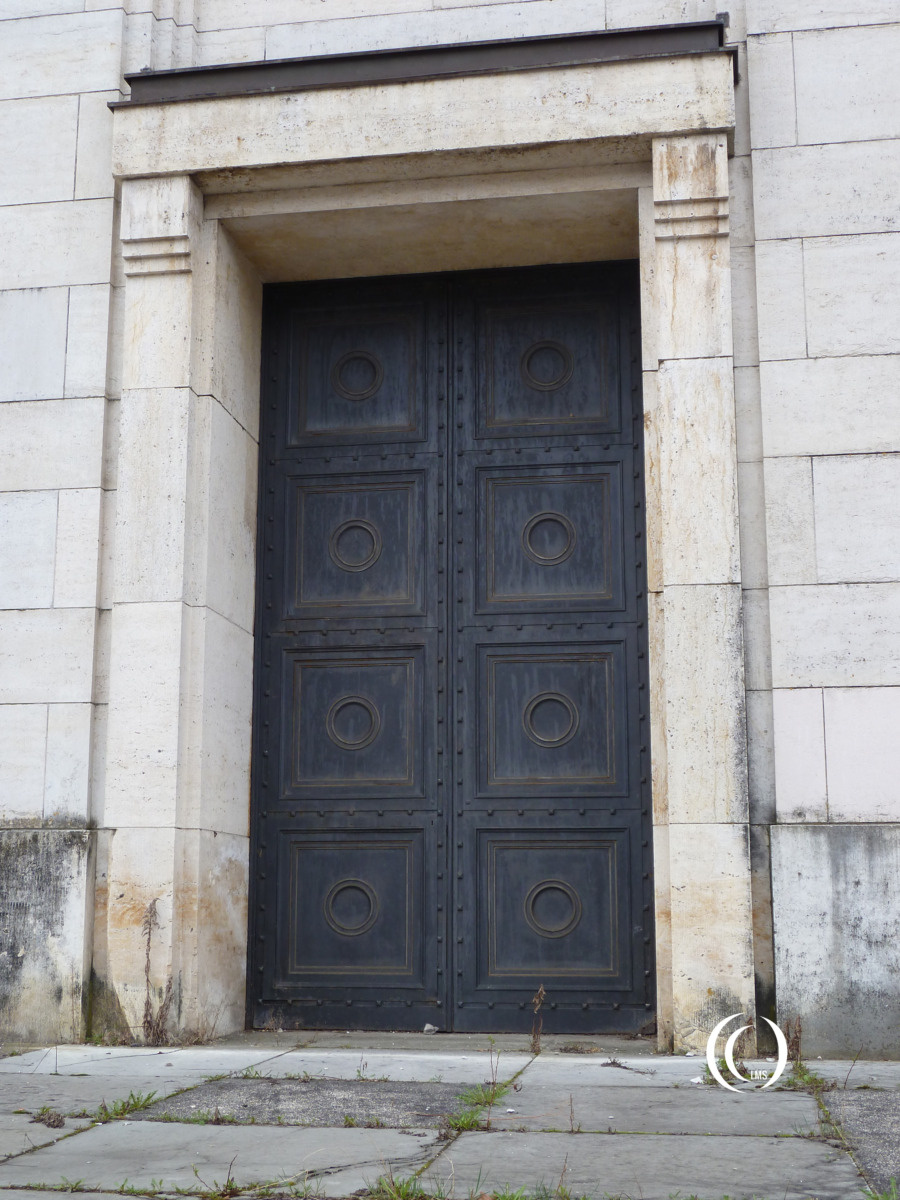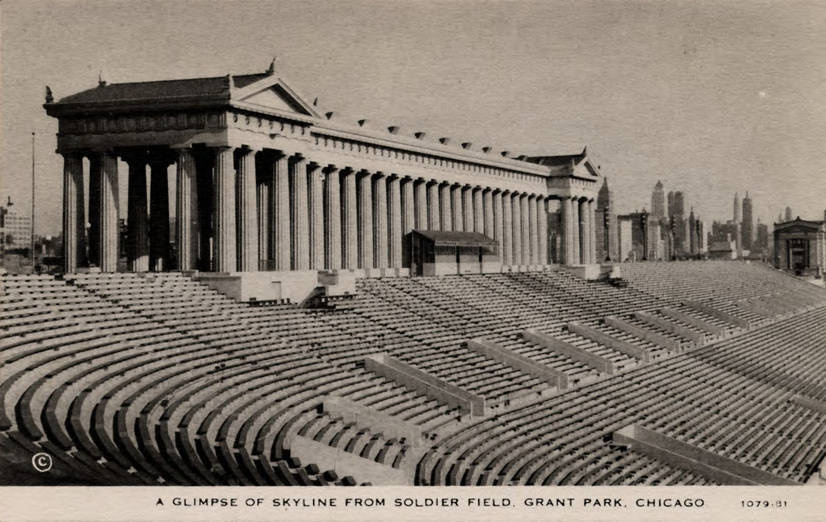
Reich Party Congress Grounds

On August 30th 1933 Nuremberg was declared the city of the Reich Party Congress, or in German Reichsparteitage, for the NSDAP by Adolf Hitler. This National Socialistic congress was an annual display of power and unity for the movement between 1933 and 1938 and a popular source to feed Nazi propaganda.
In the Southeast of Nuremberg the NSDAP Reichsparteitagsgelände (Reich Party Congress Grounds) was developed, which covered around 11 square kilometers with different buildings and memorials for parades, ceremonies and gatherings. Most of these designs came from architect Albert Speer.
East from The Große Straße (The Big Street) of the Party Congress Grounds lies the Zeppelin field. In August 1906 Ferdinand Graf von Zeppelin landed one of his airships on this field, hence the name. In German it is called Zeppelinfeld.
Zeppelin Grandstand


The main grandstand or Zeppelinhaupttribüne is 360 meters long. It was one of Albert Speer’s first projects for the Third Reich as an architect. The design is based upon the Pergamon Altar from the 2nd century BC. This grandstand is famous for the “blow the Swastika off the grandstand“ movie of the event on 25th of April 1945.






The inside of the main tribune holds a big hall of 335 cubic meters, the ceiling is 8 meters high. The walls are made of marble, there are gold shining mosaic tiles on the floor. Two stairways lead to the tribune of honour above. Inside are rooms for relaxation, toilets and a telephone exchange.



Zeppelin Field
The Zeppelin Field is 312 meter wide and 285 meter long, about the same size as 12 soccer fields. It has enough space for 200,000 people. Around the Zeppelin Field Albert Speer placed 34 small buildings which each held 6 flags. But they also had a function as they divided the seating areas and had restrooms for visitors inside.


The Nazi Party Rally’s in 1933 and 1934 were held in the Zeppelin Field, the spectators’ tribunes were still made of wood in these years. In 1935 -1936 the stone tribunes came into view.

In the evening, one hundred and twenty Flak searchlights gave off beams of light straight up towards the dark night sky as a grand spectacle. Albert Speer designed a Cathedral of light around the Zeppelin Field during the nightly Rally’s. The beams from the searchlights soared hundreds of meters into the night sky.



3rd U.S. Infantry Division
On 22 April 1945 the 3rd U.S. Infantry Division held a victory parade on Zeppelin Field to commemorate the liberation of Nuremberg. A large United States flag was used to cover up the Swastika placed on top of the grandstand. The big finale of the festivities was the blowing up of the enormous Swastika, the Nazi symbol, off the grandstand.

Notice the bricks on the stairs around the soldiers. These bricks were put there in a camouflage pattern during the war in an effort to draw less attention to the structure from the sky.

After the war
In August 1945 the Zeppelin Field was renamed Soldiers Field. The name was put up on the Grandstand together with the 3rd Army insignia in the center on the Führer stand. Notice the baseball field in the left bottom of the picture.

It might be that the new name referred to the Soldier Field stadium in Grant Park, Chicago, which got this name in 1925 to honor the US soldiers fallen in WWI. At the time its grandstand had some resemblance to the one at Zeppelin Field, as can be seen on the old picture postcard underneath.

After the war the Zeppelin Field was used by the American High School for soccer and football. In the 1970’s the pillar gallery on the left and right wings of the main grandstand were removed due to the danger of collapse. The blasts of the demolition works caused even more damage to the inside of the structure. In the 1980’s the Monster of Rock organisation used the field for their heavy Metal festival.
Fallen in decay
Because the main tribune was built rather hastily and with lower quality materials, it is deteriorating rapidly. The inside was sealed due to the danger of collapse. The rear wall, on top of the main tribune is fenced off, as is the Zeppelin Field itself. The tribune is freely accessible though. Lots of tourists visit the Rally grounds, busloads to be honest.
The city of Nuremberg has announced a large renovation project for Zeppelin Field and the grandstand.

Leni Riefenstahl
Leni Riefenstahl filmed propaganda movies on the NSDAP Rally Days in Nuremberg.
Joseph Goebbels ordered the movies to be made during the great Nazi Party Rallies. Leni Riefenstahl was innovative in her time. For example she was the first used carts to move the camera on tracks to film the action during the 1936 Olympic Games in Berlin. Besides being a movie director she was an actress, author and photographer.
During her cooperation with the Nazi Party she made 4 propaganda movies:
- 1933 – Der Sieg des Glaubens (Victory of Faith)
- 1935 – Triumph des Willens (Triumph of the Will)
- 1935 – Tag der Freiheit – Unsere Wehrmacht (Day of Freedom – Our Armed Forces)
- 1938 – Olympia, a 2 part movie on the Olympic Games in Berlin.
- Part one; Fest der Völker.
- Part 2; Fest der Schönheit (Festival of Nations and Festival of Beauty)
Here is a short movie of the Zeppelin Field taken by Landmarkscout.
Visit
Besides the fenced off area’s the tribune is open for visitors. Do search the internet if there is a concert or event going on before you visit the Zeppelin Field.
Overview on the NSDAP Rally Grounds
The NSDAP Rally Grounds at Nuremberg houses more buildings and places than we visited and wrote about.
- There is the Märzfeld (Marching Field) with its own tribune, and the Dutzendteich lake train station nearby.
- Behind the Marching Field is the Zeltlager, or camping grounds, for the SS, Wehrmacht & Hitlerjugend.
- There is the wooden KDF Town (KDF – Kraft Durch Freude, – Strength through joy).
The Municipal Stadium and the stadium swimming pools, right beside the Zeppelin Field.
There is some misinformation about Sud Kaserne (aka Merrell Barraks) above. The US Army (specifically the 2nd Armored Cavalry Regiment) occupied that facility until the end of the Cold War 1991 or 1992. There is (or was) an area open to the public just inside the main entrance with some displays about the history of the facility.
Thank you Micheal for your information.
I was stationed there from 87 to 91 Are patune with the stinger patune responsible for border patrol Czechoslovakian border andeast German border, I retired from the US Army 2015 December 31 as a master sergeant
What happened to the large eagles and huge ornamental third Reich iconography that once stood on the premises?
Thanks,
BT
Albert Speer*?
The part of this article about the SS-Barracks has moved to https://landmarkscout.com/ss-barracks-nuremberg-germany/